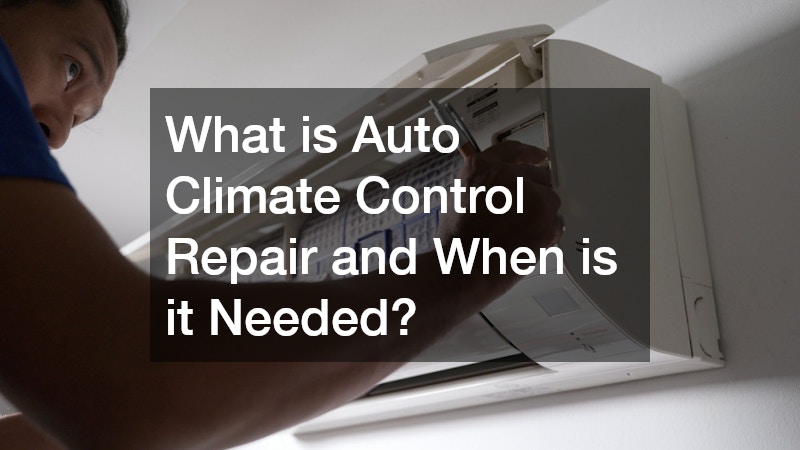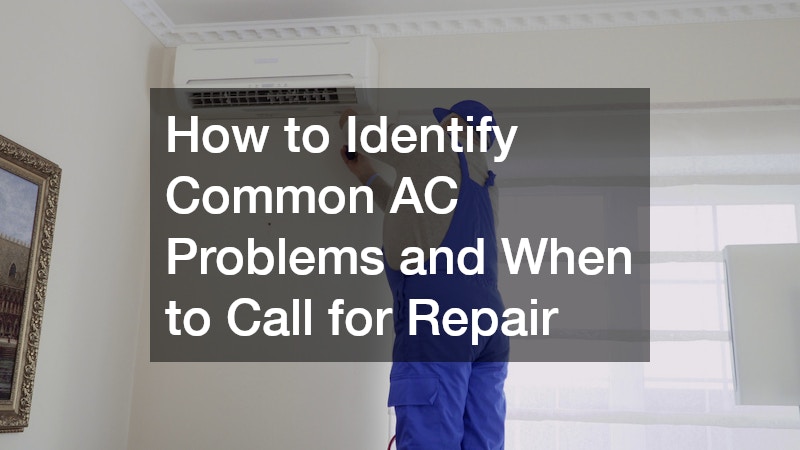Understanding how to properly prepare for an HVAC installation is crucial for every homeowner and business. This guide will walk you through all the essential aspects, including everything from selecting the right system to handling auto climate control repairs. Making informed decisions about HVAC systems can lead to not only increased comfort but also significant cost savings over time.
What is HVAC, and Why is it Important?
HVAC stands for heating, ventilation, and air conditioning, and it is essential for maintaining indoor comfort. Ensuring a reliable HVAC service is crucial as it enables you to control the climate indoors, which impacts both the environment and your comfort. Auto climate control repair plays a significant role in keeping HVAC systems efficient, ensuring they work correctly, and prolonging their lifespan.
The importance of HVAC cannot be overstated, as it directly affects energy consumption and utility bills. A functional HVAC system maintains the desired indoor temperature, whether in extreme cold or heat. Additionally, regular maintenance and repairs, including auto climate control repairs, ensure that the system operates efficiently and meets environmental standards.
Moreover, an efficient HVAC service is vital for maintaining air quality. Poor air quality linked with malfunctioning HVAC systems could negatively impact health conditions. Auto climate control repair helps mitigate these issues by efficiently managing airflow and temperature control, making it indispensable for overall well-being.
How to Choose the Right HVAC System?

Choosing the right HVAC system involves considering several essential factors, including the size of your space and your energy efficiency goals. It’s crucial to assess your specific needs and consult with HVAC contractors to determine the optimal system type and size. Auto climate control repair services can provide insights into the best practices for maintaining these systems.
One of the first steps in selecting the appropriate system includes calculating the heating and cooling loads necessary for your home or business. This step ensures that the selected HVAC system can maintain the desired comfort level without unnecessary energy consumption. Reliable HVAC contractors can facilitate this step by evaluating your specific needs.
Besides load calculations, you should also consider the technological advancements in HVAC supplies available. Modern systems may offer features such as programmable thermostats and zoning capabilities. Regular consultations with a local AC company can ensure your HVAC system selection embraces the latest technology, improving overall efficiency and comfort.
What to Expect During the HVAC Installation Process?
The HVAC installation process can be straightforward when conducted by knowledgeable HVAC contractors. Expect a thorough inspection of your existing setup and a detailed plan for the system installation, including ductwork considerations, which can significantly affect the efficiency of air conditioning and heating. Additionally, auto climate control repair checks can be implemented to ensure a seamless integration.
During installation, any outdated or inefficient components will be replaced, ensuring adherence to standards and improving performance. The positioning of the HVAC system plays a role in its potential efficiency; therefore, this should be strategically decided by the installation team. Reliable HVAC service will conclude with thorough system testing to confirm that all elements function efficiently.
Post-installation, homeowners should familiarize themselves with the basics of HVAC system management, including maintenance and troubleshooting common issues. This knowledge increases your understanding of when to request auto climate control repairs and identify minor issues before they escalate. Engaging frequently with your local AC company can provide ongoing support and flexibility when issues arise.
What are the Common Mistakes to Avoid?

Avoiding common mistakes during heating and air repairs can save time and resources. One such mistake is selecting an incorrectly sized system, which can lead to inefficient operation and increased costs over time. Engaging with experienced HVAC contractors can mitigate this issue and ensure correct sizing for optimal performance.
Another common mistake is neglecting maintenance post-installation. Regular HVAC service is crucial in catching potential issues early and reducing the need for future, costlier repairs. Auto climate control repair is an essential part of maintenance, often overlooked until comfort is compromised.
Additionally, failing to research and select an experienced contractor can lead to complications. The rise in technology in HVAC systems means expertise is vital in securing efficient operation. Always ensure the contractor is licensed and has reliable references or reviews, ensuring they can manage both installation and required auto climate control repairs efficiently.
How to Maintain Your HVAC System?
Maintaining your HVAC system effectively extends its lifespan and continues to meet efficiency needs. Regular air conditioning repair services can identify small issues before they become major concerns, especially when specialized auto climate control repair is involved. Scheduled professional inspections help prioritize performance and identify when more extensive repairs are necessary.
Regular filter replacements are a critical element of HVAC maintenance. Dirty filters can hamper system efficiency, leading to increased energy expenditure and reduced air quality. Establishing a routine with your local AC company for regular inspections and filter changes can maximize system efficiency.
In addition, periodically checking and maintaining airflow and duct systems helps avoid potential blockages and inefficiencies. Combining this with ongoing air conditioning repair, if needed, ensures that the HVAC system remains reliable throughout its lifespan. Essential parts like thermostats should also be routinely reviewed for optimum performance through necessary auto climate control repairs.
What is Auto Climate Control Repair and When is it Needed?

Auto climate control repair refers to the process of maintaining and repairing automatic climate control systems within HVAC units. These repairs are crucial when the system becomes inefficient or entirely non-functional, often affecting the overall climate control capabilities. Engaging in regular HVAC service can prevent these issues from arising unexpectedly by addressing early warning signs.
There are several indicators that an auto climate control repair is needed, such as inconsistent temperature control and unusual noises from the HVAC system. If these symptoms appear, contacting your local AC company for an assessment and recommendations is essential to avoid further complications. Expert HVAC contractors are well-equipped to manage and correct these complex issues efficiently.
In the commercial HVAC field, maintaining robust climate control systems is crucial for operational efficiency. Auto climate control repair ensures businesses maintain productive environments without interruptions due to faulty systems. Timely assessments and interventions by qualified professionals help reduce downtime and associated costs.
How to Improve the Efficiency of Your HVAC System?
The efficiency of your HVAC system can be improved by incorporating modern technology and maintaining a regular service schedule. Upgrading to the latest HVAC supplies, such as programmable thermostats, can significantly enhance system efficiency. Auto climate control repair is a vital service that supports these upgrades, ensuring they integrate seamlessly with existing systems.
Maintaining clear ducts and ensuring unobstructed airflow throughout the building are fundamental practices for boosting HVAC efficiency. This practice not only maintains efficient heating and air operations but also reduces the need for future repairs. Good practices create an optimal environment for the HVAC system to function with maximum effectiveness.
Integrating zoned HVAC systems allows for more personalized climate control in specific building areas. This zoning approach decreases unnecessary energy consumption by only heating or cooling occupied spaces. Efficient zoning relies on well-maintained auto climate control, requiring timely repairs and adjustments.
What are the Costs Involved in HVAC Installation and Repair?

The costs associated with HVAC installation vary based on factors such as system size, complexity, and specific features required. Precision in calculating these requirements can aid HVAC contractors in offering the best service at competitive pricing. Comprehensive inclusion of auto climate control repair in service contracts can contribute to overall cost reductions by anticipating potential failures.
Furthermore, the costs of regular maintenance, including essential air conditioning repair, can significantly impact financial outcomes. Planning for periodic checks ensures minor issues do not escalate into significant system failures needing extensive investments. Collaborating with a reputable local AC company can provide budget-friendly packages to maintain system efficiency.
When considering commercial HVAC systems, the financial aspect becomes more extensive. Increased complexity demands precise installation and efficient auto climate control repair. Ensuring that these services are fully considered when planning budgets will help to secure beneficial, long-term financial outcomes.
How to Choose an HVAC Contractor?
Choosing a qualified HVAC contractor is vital to securing efficient HVAC system installation and maintenance. Essential considerations include verifying license status, experience level, and customer reviews. Ensuring that the contractor has specialized in auto climate control repair supports their capacity to manage complex technology within the system.
Requesting comprehensive estimates and understanding the detailed scope of work offered can guide decisions towards the best HVAC contractors. Engaging those who communicate openly about the technologies, processes, and potential challenges ensures clarity and confidence in the project’s outcome. A trustworthy local AC company will often provide such transparency.
Additionally, securing warranties for both parts and labor ensures support when unexpected failures occur. Reliable contractors will include repairs and support options addressing both standard HVAC and advanced auto climate control problems. This long-term acknowledgment of service diminishes future risks by assuring ongoing project management.
What are the Latest Trends in HVAC Technology?
The HVAC industry has witnessed technological advancements that enhance comfort and efficiency while reducing costs. Smart HVAC systems now enable more precise climate control with less energy, making them favorable options for environmentally-conscious consumers. Auto climate control repair plays a critical role in maintaining these advanced systems, ensuring they continue to deliver optimal comfort.
Additionally, integrating renewable energy sources with HVAC systems, such as solar-powered options, has begun to gain traction. These setups contribute to lowered energy costs and greater sustainability. As such, they require specialized maintenance and occasionally involve auto climate control repairs to maintain harmony between the renewable sources and HVAC operations.
Modern innovations include improved insulation materials in HVAC supplies, enhancing overall building energy efficiency. Advanced monitoring systems for air quality and temperature create responsive environments, relying on precise auto climate control repair to facilitate immediate adjustments. In this rapidly evolving sphere, staying informed about trends is fundamental for optimal HVAC decision-making.
Investing in a new Heating, Ventilation, and Air Conditioning (HVAC) system represents a considerable financial commitment, making its long-term performance and energy efficiency crucial considerations for any property owner. A comprehensive understanding of the entire lifecycle of your HVAC system, encompassing the initial selection process, professional installation, consistent maintenance practices, and timely repairs, empowers you to make well-informed choices tailored to your unique requirements. These informed decisions will not only guarantee optimal comfort within your indoor spaces but also translate into substantial cost savings over the lifespan of the system.
The journey begins with the careful selection of an HVAC system that aligns with your specific needs, considering factors such as the size of your property, insulation quality, climate conditions, and desired energy efficiency ratings. Consulting with qualified HVAC professionals during this stage is invaluable. Their expertise can guide you in choosing the most appropriate system type, capacity, and features to maximize performance and minimize energy consumption.
Once the ideal system is selected, the installation process is paramount. Proper installation by certified technicians is essential for ensuring the system operates safely and efficiently. Incorrect installation can lead to reduced performance, increased energy bills, and even premature system failure. Professional installers possess the knowledge and tools necessary to connect all components correctly, ensure proper airflow, and verify the system’s functionality.
Beyond the initial installation, a proactive approach to maintenance is key to maximizing the lifespan and efficiency of your HVAC system. Regular maintenance, typically performed annually or semi-annually, involves tasks such as cleaning or replacing air filters, inspecting and cleaning coils, checking refrigerant levels, lubricating moving parts, and testing system controls. Consistent maintenance not only prevents minor issues from escalating into costly repairs but also helps the system operate at peak efficiency, reducing energy consumption and lowering utility bills.
Despite diligent maintenance, HVAC systems may occasionally require repairs due to normal wear and tear or unforeseen circumstances. Identifying and addressing issues promptly is crucial to prevent further damage and maintain optimal comfort. Engaging qualified HVAC technicians for repairs ensures that the work is done correctly and safely, using appropriate replacement parts. Attempting DIY repairs can often lead to more significant problems and potentially void warranties.



